Which Keywords Do My Competitors Rank For?

You can’t generate a list of all the keywords your competitors rank for with the click of a button, but by doing a bit of research, you can create a fairly accurate list of keywords that can inform your own SEO strategy.
I get this question all the time from people trying to outrank competitors on certain terms: How can we determine all the keywords are competitors are ranking for? While there’s no plug-and-play solution that will list all the keywords a competing site ranks for in Google (just as there’s no gadget that tells you what keywords your site ranks for), you can generate a fairly accurate list of keywords your competitors are using with some light detective work.
Generating this counterintelligence will help you decide whether or not you want to compete using the same keywords or look for less competitive alternatives (both sensible SEO strategies depending on your approach). It can also help you brainstorm related keywords if you’re starting your SEO efforts from scratch and haven’t a clue where to begin. The goal of this research is for you to generate a spreadsheet containing 20-100 keywords used by your competitors and then use that list to:
- Rank keywords based on their value to your business
- Track how you rank in comparison to your competitors for each keyword
- Brainstorm additional keywords not uncovered by your research that would be useful in driving traffic
How to do competitive keyword research
Google Keyword Planner
Google’s Keyword Planner tool lets you research keywords based on landing pages. I’m not sure what behind-the-scenes algorithmic witchcraft Google is using to produce the keywords related to each URL you enter, but the keywords that shoot out are quite accurate and a helpful first step in setting up a keyword list. In this example, I’ve used Preserve Products, a fellow B Corp we like a lot. They sell tableware, food storage and bath items made from recycled plastic.
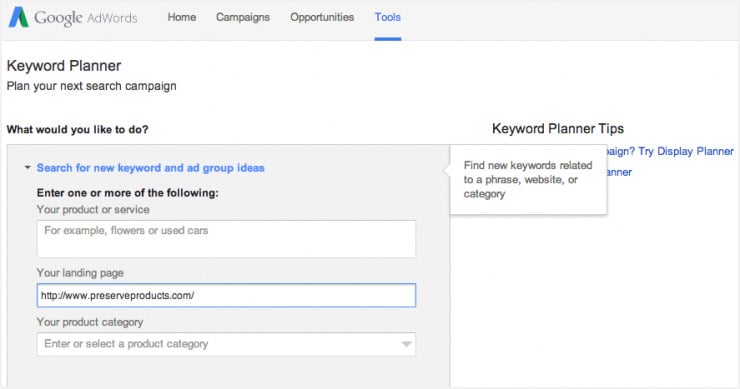
Google Keyword Planner generated a keyword list for Preserve Products that included non-branded keywords like “kitchen food storage” and “large plastic cutting board.”
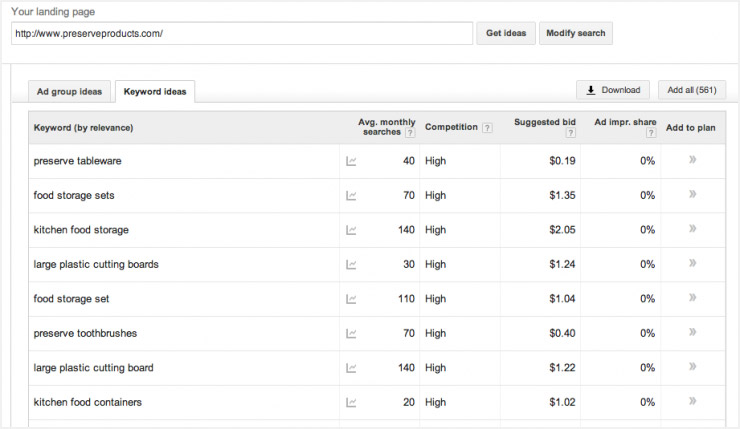
Use the keywords generated here to begin the keyword list in your spreadsheet. (To use Google Keyword Planner you have to set up an Adwords account, but don’t worry, it’s free.)
View your competitor’s website content
The next step to figuring out your competitor’s keywords is to visit their website and make note of the content. The best way to do this is by looking at their back end. (Don’t worry, this is a completely above board practice!)
Metadata
Your web browser has an option to View > Source. This lets you take a look at the code on any website, and for our purposes, gives you access to your competitor’s metadata so you can do some keyword analysis. What you’re looking for here are the titles and descriptions on the homepage. I’ve used Yellow Leaf Hammock Shop, another B Corp, as an example here because they have very keyword-rich metadata. (Good on them! It means they’re making an SEO effort.)
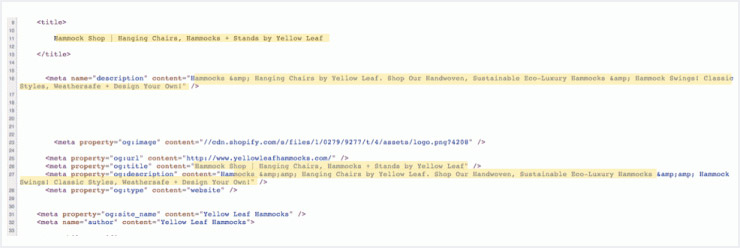
You can find your competitor’s metadata in the source by looking at the top of the document inside the <head> element. (Or just search “meta” using “Find on Page”!) Based on what we see here (I’ve highlighted the keywords in the meta tags), Yellow Leaf is optimizing for these keywords:
- Hammock shop
- Hanging chairs
- Hammock stands
- Handwoven
- Sustainable
- Hammock swings
- Classic styles
- Weathersafe
- Design-your-own
How do we know? Because as we can see from the source, Yellow Leaf is using these keywords in their metadata.
Markup
Metadata isn’t the only place to look for keywords. Review all page titles, H1s, H2s, and image alt text on a website, too. Don’t worry, though: you don’t have to do it manually. There are free tools you can use that scan websites for this data. The Screaming Frog SEO Spider tool is a downloadable app that scans page titles, meta descriptions, H1s and H2s.

And FeedtheBot’s image SEO tool, designed to help you improve how Google crawls your images, generates a list of images and alt tags from any URL.
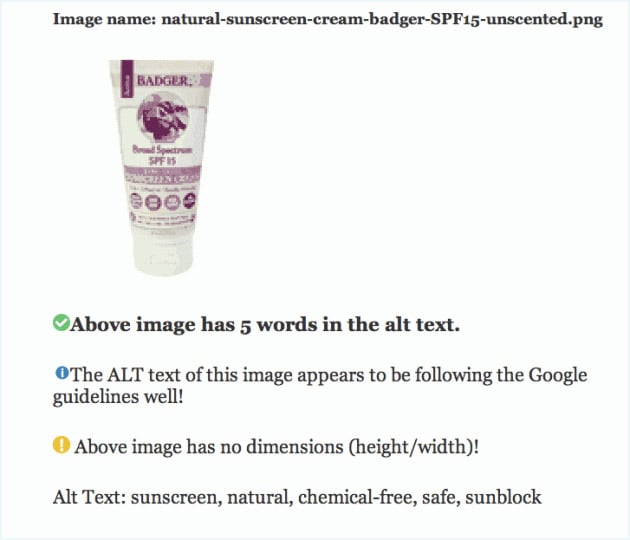
Looking at these examples it is safe to assume your competitors are trying to rank for keywords like “chemical-free sunblock” or “supply chain sustainability,” so you could add those phrases to your spreadsheet.
Can I see where my competitor is ranking for a certain keyword?
There are a host of online tools (most of them paid) that allow you to research your competitor’s exact position in the Google search engine results page (SERP) for a particular keyword. My favorite tool is Moz’s Rank Tracker. It’s a fast and easy way to check and track rankings for yourself and your top competitors.
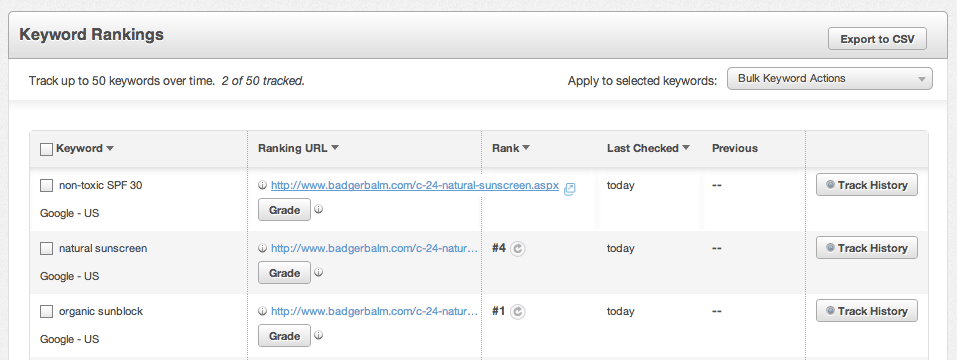
Moz isn’t free, however. SERPs has a free rank tracking tool that works almost as well as Moz, but it takes about a minute to generate rankings for each keyword and URL combination, so it’s time consuming to do a high volume of research. You can also do keyword research the old fashioned way by logging out of Google (so your search history isn’t tailored to your personal preferences), searching for keywords, and noting where your competitors pop up. By logging out of Google to clear our search history and plugging in keywords, we can see where you and competitors rank for certain searches.
Rating keywords by search volume
Just because your competitor is trying to rank for a particular keyword doesn’t mean it’s a smart idea. It behooves you to do your own keyword research once you’ve generated a list of competitors’ keywords. Once again, Google Adwords’ Keyword Planner can help with this.
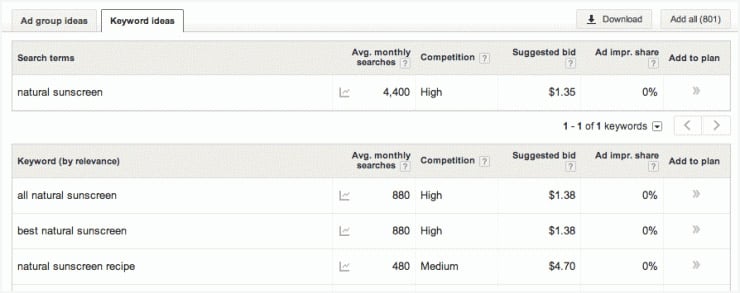
The end result
Once you’ve completed your competitive keyword research you should come away with a list of the quality SEO keywords your competitors are using and how they rank. This document will help immensely with your own SEO strategy and future keyword planning.

